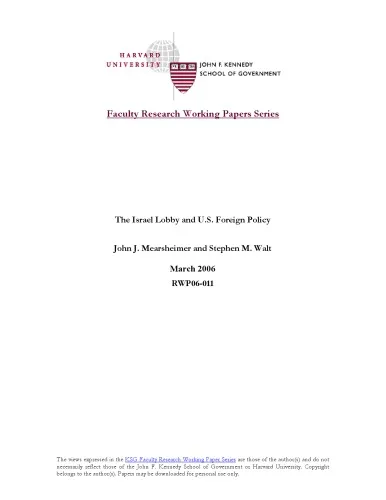Regulating Big Tech: Policy Responses to Digital Dominance
4.5
بر اساس نظر کاربران

شما میتونید سوالاتتون در باره کتاب رو از هوش مصنوعیش بعد از ورود بپرسید
هر دانلود یا پرسش از هوش مصنوعی 2 امتیاز لازم دارد، برای بدست آوردن امتیاز رایگان، به صفحه ی راهنمای امتیازات سر بزنید و یک سری کار ارزشمند انجام بدینکتاب های مرتبط:
معرفی کتاب "Regulating Big Tech: Policy Responses to Digital Dominance"
کتاب "Regulating Big Tech: Policy Responses to Digital Dominance" اثر مشترک مارتین مور و دامیان تمبینی، یکی از برجستهترین تلاشها برای بررسی تأثیر گسترده شرکتهای فناوری بزرگ بر سیاست، اقتصاد و جامعه است. این کتاب با ارائه تحلیلهای دقیق و جامع، به چگونگی پاسخ دولتها و سیاستگذاران به سلطه دیجیتال این شرکتها پرداخته و به بررسی استراتژیها و ابزارهای ممکن جهت تنظیمگری آنها میپردازد.
خلاصهای از کتاب
این کتاب با نگاهی جامع به تاریخچه و ظهور Big Techهایی مانند Google، Facebook، Amazon و Apple آغاز میشود. نویسندگان به آسیبهایی که این شرکتها به جامعه وارد کردهاند، همچون تأثیر بر حریم خصوصی، اخبار جعلی، و تمرکز قدرت اقتصادی، اشاره میکنند. سپس به تحلیل اقدامات مختلف کشورها در مواجهه با این شرکتها و راهکارهای پیشنهادی سیاستی پرداخته میشود.
یکی از نقاط قوت اصلی این کتاب، تمرکز آن بر ابزارهای قانونی، اقتصادی و بینالمللی است که میتوانند برای کاهش تمرکز بیش از حد قدرت در دست Big Techها مورد استفاده قرار گیرند. همچنین به چالشهایی که سیاستگذاران با آن روبرو هستند، مانند لابیگری سنگین، مقاومت عمومی و شکافهای قانونی اشاره میشود.
نکات کلیدی
- شرکتهای Big Tech چگونه قدرت اجتماعی، سیاسی و اقتصادی خود را بر جامعه تحمیل کردهاند.
- مقایسه سیاستهای نظارتی کشورهای مختلف مانند اتحادیه اروپا، آمریکا و چین بر علیه سلطه دیجیتال.
- پیشنهاد مدلهای متنوع از جمله اعمال اصول antitrust، شفافسازی الگوریتمها و افزایش پاسخگویی.
- چالشها و فرصتهای جهانی برای تنظیمگری در دنیای دیجیتال.
جملات مشهور از کتاب
"قدرت شرکتهای Big Tech از تأثیرگذاری بر رفتار فردی تا شکلدهی به اقتصاد جهانی، تهدیدی برای دموکراسی است."
"شفافیت و پاسخگویی در فرآیندهای دیجیتالی، نه تنها یک ضرورت اخلاقی بلکه یک الزام برای حفظ جامعه آزاد است."
چرا این کتاب اهمیت دارد؟
با رشد فوقالعاده تکنولوژی و نفوذ گسترده Big Techها، پیامدهای اجتماعی، سیاسی و اقتصادی سلطه دیجیتال بیش از هر زمان دیگری محسوس شده است. این کتاب دانش و ابزارهای تحلیلی لازم برای درک چگونگی مقابله با تمرکز قدرت در دست چند شرکت خاص و جلوگیری از آسیبهای بیشتری به سیستمهای دموکراتیک و شهروندان را فراهم میآورد.
برای پژوهشگران، سیاستگذاران و علاقهمندان به حوزه سیاست عمومی و فضای دیجیتال، این کتاب بهعنوان یک منبع بیبدیل ارائه شده و راهنمایی جامع برای مقابله با چالشهای پیچیدهای که در دنیای دیجیتال پیشروی ما قرار دارد محسوب میشود.
Introduction to "Regulating Big Tech: Policy Responses to Digital Dominance"
The digital age has brought unprecedented advancements that have reshaped the way societies function, businesses operate, and individuals engage with one another. However, with these advancements comes a growing concern over the immense power wielded by Big Tech companies. In "Regulating Big Tech: Policy Responses to Digital Dominance,” Martin Moore and Damian Tambini explore one of the most pressing issues of our time: how governments, institutions, and societies can effectively regulate technology giants to ensure fairness, competition, and the protection of democratic values.
Technology giants such as Google, Amazon, Facebook (now Meta), and Apple (often referred to as "GAFA") dominate critical aspects of the digital economy. Their influence extends into areas such as advertising, public discourse, data collection, and even artificial intelligence. This book provides a comprehensive examination of the global regulatory landscape, offering valuable insights into the challenges and opportunities of regulating Big Tech in an era of digital dominance. Whether you are a policymaker, academic, industry professional, or a concerned citizen, this book dives into the complex policy debates, legal frameworks, and ethical considerations necessary for reshaping our digital future.
Detailed Summary of the Book
The book is structured to guide readers through the evolution of digital platforms from innovative disruptors to dominant gatekeepers of global industries. It examines the key areas of concern such as market concentration, data privacy, misinformation, and algorithmic bias. Moore and Tambini delve into how monopolistic practices and lack of accountability have enabled Big Tech to amass unparalleled power, often at the expense of smaller competitors, democratic institutions, and individual consumers.
Through a mix of historical precedent, empirical evidence, and policy analysis, the authors evaluate existing regulatory responses and their effectiveness. They explore antitrust measures, regional efforts like the EU’s General Data Protection Regulation (GDPR), and legislative attempts in the United States and other jurisdictions. The book also presents case studies that demonstrate both successes and failures, providing readers with a nuanced understanding of this critical policy issue.
Ultimately, the authors call for a collaborative, multi-stakeholder approach to regulation—an approach that balances innovation with accountability while ensuring that the immense benefits of technology do not come at too steep a societal cost.
Key Takeaways
- Big Tech companies have grown into monopolistic entities, raising concerns over market concentration and unequal competition.
- Existing regulatory measures, such as antitrust efforts, are often insufficient to address the complexities of digital dominance.
- Global coordination is essential, as the transnational nature of Big Tech often outpaces the jurisdictional reach of national regulators.
- The balance between fostering innovation and ensuring accountability is delicate but crucial for future regulation.
- Ethical considerations, including privacy rights, misinformation, and democratic integrity, need to be central to regulatory frameworks.
Famous Quotes from the Book
“The challenge is not merely to regulate Big Tech, but to do so in a manner that preserves democracy, promotes fairness, and respects fundamental human rights.”
“Regulating the digital economy is not about stifling innovation. It’s about ensuring that innovation works for the many, not just the few.”
“In addressing digital dominance, we must recognize that the global reach of Big Tech requires regulatory solutions that are innovative, flexible, and universally enforceable.”
Why This Book Matters
In an era where digital platforms play such a central role in our lives, "Regulating Big Tech: Policy Responses to Digital Dominance" is a timely and necessary contribution to our understanding of how to navigate complex policy challenges. The power of Big Tech extends far beyond technology—it impacts economics, culture, politics, and even personal liberties. Without comprehensive regulatory frameworks, the unchecked dominance of these companies threatens values such as competition, fairness, and democracy.
What makes this book particularly important is its global perspective. Moore and Tambini recognize that the digital economy is inherently international, and as such, require solutions that account for different cultural, legal, and economic contexts. It’s not just a book for policymakers or industry leaders; it’s a clarion call for anyone who values a democratic and equitable digital future.
By unpacking the roots of digital dominance and highlighting potential pathways forward, this book equips readers with the knowledge and tools necessary to engage in meaningful discussions about how to regulate Big Tech responsibly. As debates around technological governance and accountability continue to grow, "Regulating Big Tech" is essential reading for anyone seeking to influence or understand this critical arena.
دانلود رایگان مستقیم
شما میتونید سوالاتتون در باره کتاب رو از هوش مصنوعیش بعد از ورود بپرسید
دسترسی به کتابها از طریق پلتفرمهای قانونی و کتابخانههای عمومی نه تنها از حقوق نویسندگان و ناشران حمایت میکند، بلکه به پایداری فرهنگ کتابخوانی نیز کمک میرساند. پیش از دانلود، لحظهای به بررسی این گزینهها فکر کنید.
این کتاب رو در پلتفرم های دیگه ببینید
WorldCat به شما کمک میکنه تا کتاب ها رو در کتابخانه های سراسر دنیا پیدا کنید
امتیازها، نظرات تخصصی و صحبت ها درباره کتاب را در Goodreads ببینید
کتابهای کمیاب یا دست دوم را در AbeBooks پیدا کنید و بخرید
1514
بازدید4.5
امتیاز0
نظر98%
رضایتنظرات:
4.5
بر اساس 0 نظر کاربران
Questions & Answers
Ask questions about this book or help others by answering
No questions yet. Be the first to ask!
















